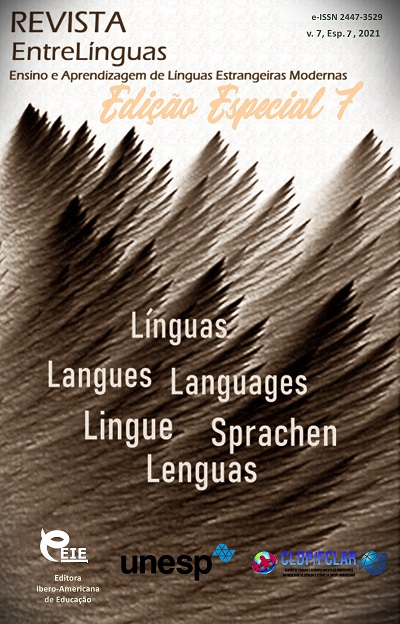Aspecto axiológico del concepto “extraño” en artículos publicisticos
DOI:
https://doi.org/10.29051/el.v7iesp.7.16296Palabras clave:
Antropocentrismo, Concepto, Valor, Valoración, Axiología, Análisis axiológico, Lingüística axiológicaResumen
El artículo examina el estatus axiológico del concepto “extraño” en los artículos periodísticos dedicados al SARS-CoV-2. La interpretación axiológica del concepto en cuestión se produce a través de diversos juicios de valor subjetivos y objetivos. El propósito del artículo es un análisis axiológico del concepto “extraño”, que revela significados evaluativos ocultos o explícitos, positivos, negativos o neutrales de este concepto en la imagen del mundo en el idioma inglés moderno. A través del estudio del componente axiológico de los conceptos, la especificidad y las preferencias mentales se muestran no solo de una personalidad lingüística específica individual, sino también de las personas en su conjunto en un período de tiempo determinado. A través del prisma del análisis axiológico de conceptos se revelan las peculiaridades de las preferencias valorativas de una personalidad lingüística, que fuera del contexto pueden adquirir un estatus axiológico diferente. Así, luego del estudio del concepto “extraño” se reveló que este concepto tiene un estatus axiológico negativo en la axiosfera de la imagen del mundo en lengua inglesa.
Descargas
Citas
ANISIMOV, S.F. Introduction to axiology: textbook on philosophy. M.: Modern notebooks, 128 p. 2001.
ARCHIE, J. Bahm Axiology, the Science of Values: Ethics, the Science of Oughtness Rodopi, 134. 1993.
ARUTYUNOVA, N.D. About the object of the general assessment. Issues of linguistics. No. 3. 13-24. 1985.
ARUTYUNOVA, N.D. Axiology in the mechanisms of life and language. Problems of structural linguistics: collection of articles. Collection of scientific works. M., 5-23. 1984.
ARUTYUNOVA, N.D. Introduction. About the Whole on the Whole. Time and Space in the Conceptualization of Reality. Logical Analysis of Language. The Semantics of the Beginning and the End. M.: Indrik, 3-18.2002.
ARUTYUNOVA, N.D. Types of linguistic meanings: assessment, event, fact. In charge G.V. Stepanov; Academy of Sciences of the USSR, Institute of Linguistics. Moscow.: Nauka, 341 p. 1988.
Cambridge Dictionary https://dictionary.cambridge.org/ru/ (reference date: 14.12.2020)
DEMYANKOV, V.Z. Interpretation of political discourse in the media. Language of the mass media: a textbook for universities. M: Academic project, 374 - 394. 2008.
FINDLAY, J. N. Axiological Ethics. New York: Macmillan, 1970, 100. 1970.
KARASIK, V. I. Categorical signs in the word meaning: textbook. MOPI. - M., 1988.
KARASIK, V.I. Language circle: personality, concepts, discourse. Volgograd: Change, 2002. - 477 p. 2002.
KRZESZOWSKI, T.P. The Axiological Aspect of Idealized Cognitive Models. In Tomaszczyk, J. and Lewandowska, B. (eds) Meaning and Lexicography. Amsterdam: John Benjamins, 135-165. 1990.
KUBRYAKOVA, E.S., DEMYANKOV, V.Z., PANKRATS, Y.G., & LUZINA, L.G. Dictionary of Cognitive Terms in Brief.– M.: The Moscow State University Press, 245 p. 1996.
KUZINA, O.A. The axiological aspect of the linguistic representation of the image of Ukraine in the English-speaking mass media: Dis. by Ph.D. in Philology. St. Petersburg, 2019. - 161 p. 2019.
NICHOLAS RESCHER. Value Matters: Studies in Axiology, De Gruyter, 140.2004.
SEREBRENNIKOVA, E.F. Ethnosemiometry as a Way of Linguistic Axiological Analysis. Ethnosemiometry of Value Meanings: Collective Monograph.– Irkutsk: ISLU,. – S. 8 – 62.2008.
WOLF, E.M. Functional Semantics of Evaluation.– M.: Editorial of the Ukrainian SSR, – 280 p. 2002.
Descargas
Publicado
Cómo citar
Número
Sección
Licencia

Esta obra está bajo una licencia internacional Creative Commons Atribución-NoComercial-CompartirIgual 4.0.
Os manuscritos aceitos e publicados são de propriedade da Revista EntreLínguas. Os artigos publicados e as referências citadas na Revista EntreLínguas são de inteira responsabilidade de seus autores.
Transferência de direitos autorais – autorização para publicação
Caso o artigo submetido seja aprovado para publicação, já fica acordado que o(s) autor(es) autoriza(m) a UNESP a reproduzi-lo e publicá-lo na EntreLínguas, entendendo-se os termos “reprodução” e “publicação” conforme definição respectivamente dos incisos VI e I do artigo 5° da Lei 9610/98. O artigo poderá ser acessado pela rede mundial de computadores (Internet), sendo permitidas, a título gratuito, a consulta e a reprodução de exemplar do artigo para uso próprio de quem a consulta, desde que haja a citação ao texto consultado. Essa autorização de publicação 328 EntreLínguas, Araraquara, v. 1, n .2, p. 323-328, jul./dez. 2015 não tem limitação de tempo, ficando a UNESP responsável pela manutenção da identificação do(s) autor(es) do artigo. Os artigos publicados e as referências citadas na Revista EntreLínguas são de inteira responsabilidade de seus autores.











